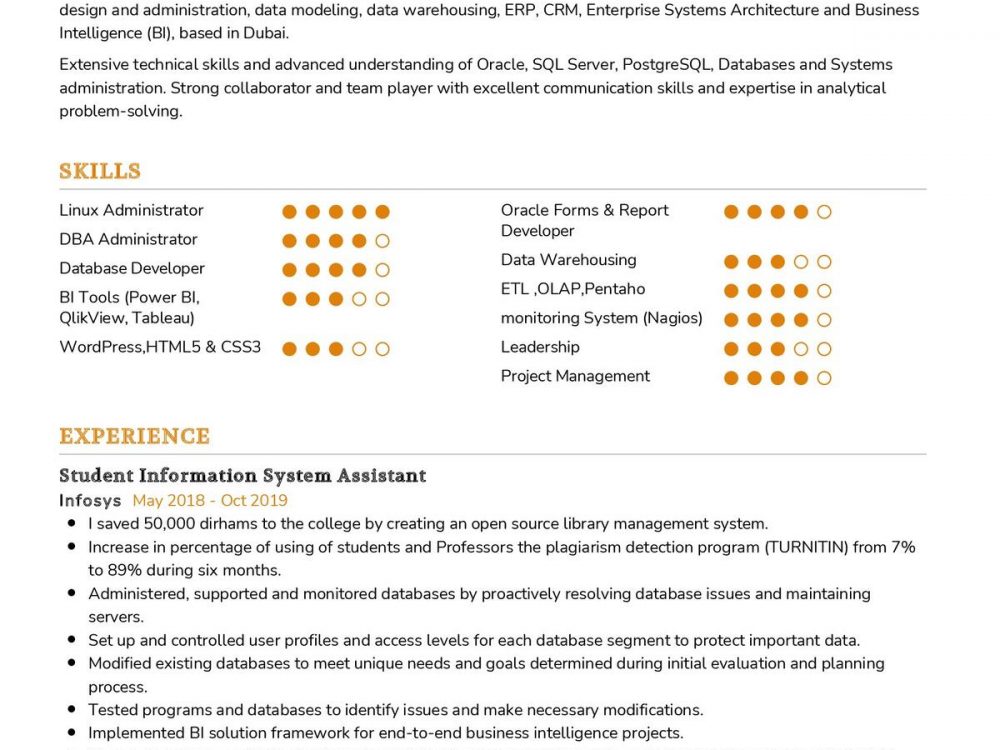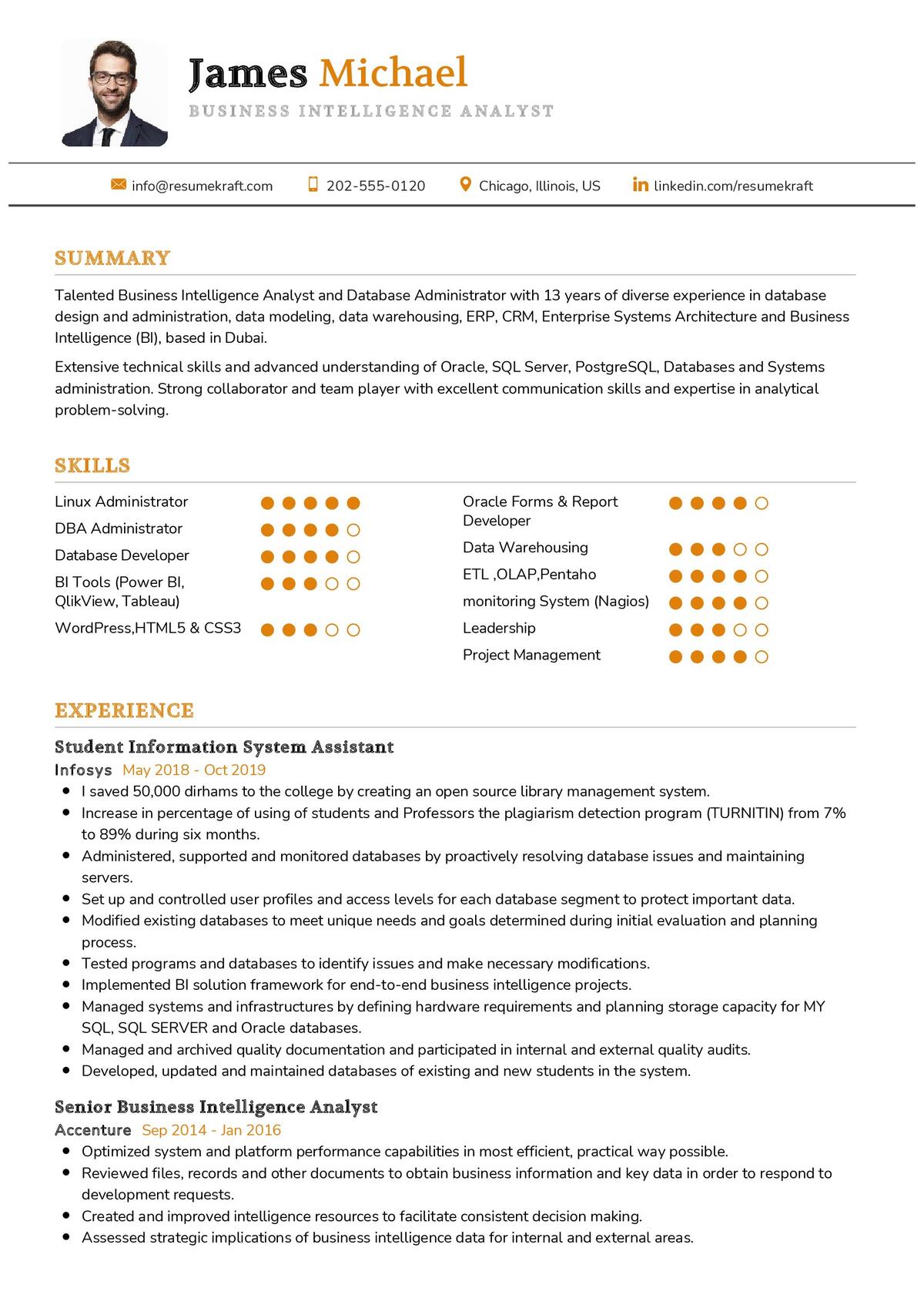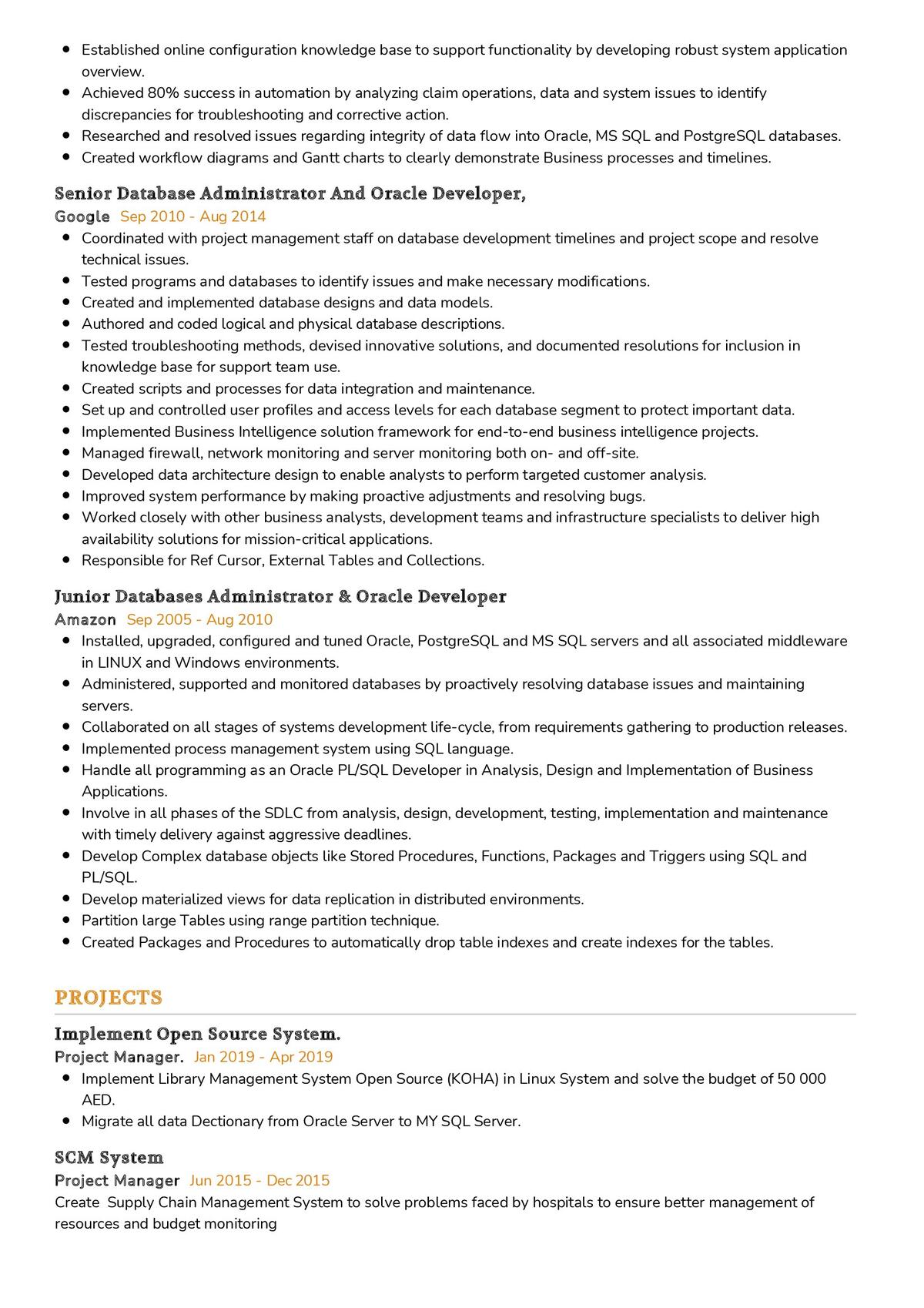What Should Be Included In A Business Intelligence Analyst Resume?
Writing a resume for a business intelligence analyst position is no easy task. It requires a great deal of research, thought, and attention to detail to ensure your resume accurately reflects your skills and experience. The resume should be tailored to the exact position you are applying for, and must include information about your experience and qualifications in the field.
When creating a resume for a business intelligence analyst position, it is important to include key elements such as education, certifications, and technical skills. Your education should include the degrees or certifications you have that are relevant to the position. If you possess special certifications in the field, such as a certification in data analysis, be sure to list them on your resume.
Your technical skills should be highlighted as well, as many employers look for candidates with hands-on experience in the field. This includes specific software knowledge, such as Excel and Tableau, as well as familiarity with programming languages and databases. Show off your technical proficiency by giving examples of projects you’ve completed or challenges you’ve solved.
In addition to these elements, your resume should also include any past experience you have in the field. Any relevant internships, volunteer work, or job experience should be mentioned in the resume. If you have held any positions related to business intelligence, such as a data analyst or data engineer, be sure to list them.
Lastly, your resume should showcase your non-technical skills, such as communications, problem solving, and project management. These ‘soft’ skills are just as important as the technical ones, and they can help employers identify you as a well-rounded candidate.
Overall, creating a business intelligence analyst resume requires a great deal of effort and thought . It should include an effective summary of your relevant experience, technical skills, and soft skills. Make sure to highlight your accomplishments and provide tangible examples of your technical proficiency by giving examples of projects you’ve completed or challenges you’ve solved. This will help employers better understand your qualifications and be more likely to call you for an interview.
What Skills Should I Put On My Resume For Business Intelligence Analyst?
As a Business Intelligence Analyst, you must have the right set of skills to be successful in the field. Having a well-crafted resume is essential in order to stand out amongst other candidates. Many employers often search for the right skills when screening resumes, so it is important to make sure your resume highlights the skills needed to be a successful Business Intelligence Analyst.
The skills required of a Business Intelligence Analyst are varied and include both technical and people skills. Some of the must-have skills include an understanding of data analysis, database development, data modeling, database management, computer programming, and report writing. Additionally, Business Intelligence Analysts should also have excellent problem-solving and communication skills, as well as the ability to work with a variety of people.
When writing a resume for a Business Intelligence Analyst position, it’s important to highlight the specific skills that help demonstrate your abilities. For example, if you have experience with database development, highlight your experience in the development and implementation of data models and database designs. If you have experience in computer programming, mention the languages with which you are familiar, as well as specific applications that you can use. The same goes for report writing and data analysis; emphasize the programs, software, or techniques you are proficient in.
It is also important to highlight any experience you have working in teams or with clients. Being able to work well with others is an important part of being a successful Business Intelligence Analyst. Additionally, focus on soft skills such as communication, problem-solving, and analytical thinking to demonstrate your ability to think critically and quickly.
By highlighting the right skills on your resume, you will be sure to make a great impression on potential employers . Emphasize your technical abilities such as your knowledge of data modeling, database design, programming languages, report writing, and data analysis tools. Showcase your ability to work in teams and with clients, as well as your soft skills such as communication, problem-solving, and analytical thinking.
What Is The Job Description Of The Business Intelligence Analyst?
A Business Intelligence Analyst is a position that is becoming increasingly popular in the corporate world. The role of this individual is to analyze business data and provide meaningful information that can be used to make informed business decisions. This position requires a high degree of technical skill, as well as an analytical mind. The Business Intelligence Analyst should also be comfortable working with large amounts of data and leveraging different data sources to provide useful insights.
The job description of a Business Intelligence Analyst includes gathering, cleansing, and analyzing data from a variety of sources. This might include internal company data, industry benchmarks, customer surveys, and customer feedback. The analyst must also have the ability to identify potential problems, develop solutions, and communicate their findings to the appropriate stakeholders. After analyzing the data, the analyst will create visualizations and reports that can be used to support the decision-making process.
In addition to their analytical skills, the Business Intelligence Analyst must also possess strong problem-solving skills. They must be able to identify trends and patterns in the data, recognize potential issues, and come up with creative solutions to address them. They must have excellent communication skills, as they will need to present their findings to the appropriate stakeholders. They must also be able to work well in a team, as they will be working closely with other members of the organization to ensure that their insights are put into practice.
Overall, the role of a Business Intelligence Analyst is both challenging and rewarding. Those who possess the required skills and experience to excel in this position can look forward to a successful career in the field.
What Is A Good Objective For A Business Intelligence Analyst Resume?
When writing a resume for a business intelligence analyst position, it is important to craft an effective objective statement. This statement should be concise and to the point, summarizing your skills and experience. It should also make a clear connection between the job you are seeking and the employer’s needs.
A good objective for a business intelligence analyst resume should showcase your experience in data analysis, data modeling, and data visualization. It should also highlight your ability to understand and interpret complex data sets. Additionally, it should demonstrate your proficiency in retrieving and analyzing data from multiple sources, creating reports and dashboards, and developing algorithms for data analysis.
It is also important to note any relevant certifications and qualifications that you possess, such as the Certified Analytics Professional (CAP) certification. This will help demonstrate your commitment to the analytics industry and increase your chances of standing out from the competition.
Finally, your resume objective should focus on how you can add value to the employer. Consider mentioning the types of insights and value you can provide to the organization as well as how you can help the employer meet their goals.
By crafting an effective objective statement, you can ensure that your resume stands out and gives the hiring manager a clear idea of why you are the ideal candidate for the position.
What Are The Career Prospects In The Business Intelligence Analyst?
Business intelligence analysts are in high demand as organizations increasingly rely on data-driven decision-making. The role of the business intelligence analyst is to analyze and interpret data to provide insights that help inform strategic decisions. By leveraging a wide range of data sources and technologies, business intelligence analysts can take raw data and turn it into actionable insights.
The job outlook for business intelligence analysts is strong. According to the U.S. Bureau of Labor Statistics, the number of jobs for business intelligence analysts is expected to grow by 11% from 2018 to 2028. This growth is well above the national average for all occupations, making it a great career choice for those looking for a stable job with potential for growth.
Not only is the job outlook promising, but business intelligence analysts can also expect to earn a competitive salary. The median annual wage for business intelligence analysts is $86,510, according to the U.S. Bureau of Labor Statistics. Furthermore, those with a master’s degree in business analytics or a related field may be able to command higher salaries.
Business intelligence analysts also have the potential to move up in their careers. With experience and the right qualifications, they can become data scientists, data engineers, or analytics leaders. They may also find opportunities in a variety of industries, including healthcare, finance, and technology.
For those interested in a career as a business intelligence analyst, it’s important to have a strong understanding of data analytics tools and techniques. Having a degree in business analytics or a related field is also beneficial. Additionally, having strong problem-solving, communication, and interpersonal skills can help business intelligence analysts be successful in their role.
Key Takeaways for an Business Intelligence Analyst resume
Writing a successful resume for a Business Intelligence Analyst position is no small feat. It requires careful consideration of the key takeaways that will help you stand out from other applicants. The following are some key takeaways to consider when writing your resume for a Business Intelligence Analyst position.
First, you need to demonstrate your analytical skills. A business intelligence analyst must be able to identify key trends, understand complex data sets, and develop insights from data. To demonstrate these skills on your resume, list any relevant courses you’ve taken or certifications you’ve earned. You should also include any projects you’ve completed that demonstrate your analytical skills.
Second, you need to demonstrate your technical skills. Business intelligence analysts must be able to work with data visualization software, predictive analytics tools, and other business intelligence software. Make sure to list any relevant technical skills on your resume.
Third, you need to demonstrate your communication skills. Business intelligence analysts must be able to communicate their findings to their colleagues, stakeholders, and customers. Make sure to include any relevant projects or presentations that demonstrate your ability to effectively communicate complex data sets.
Finally, you need to demonstrate your problem-solving skills. Business intelligence analysts must be able to identify opportunities to improve processes and create solutions to complex problems. Include any relevant courses or certifications that demonstrate your problem-solving skills.
By following these key takeaways, you can write a successful resume for a business intelligence analyst position. Make sure to include any relevant courses, certifications, projects, and presentations that showcase your skills and qualifications. With a well-crafted resume, you can land the business intelligence analyst position of your dreams.



